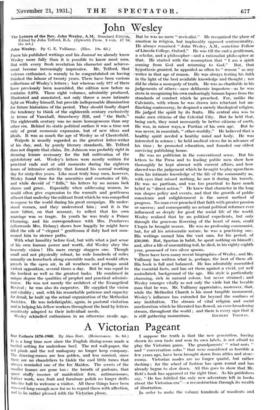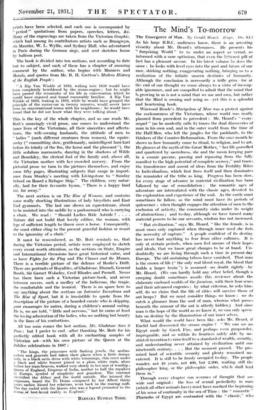A Victoria n Pageant
Our Fathers 1870-1900. By Alan Bott. (Heinemann. 8s. 6d.) Jr is a long time now since the English dining-room made a tactful setting for underdone beef. The red wall-paper, the red plush and the red mahogany no longer keep company. The drawing-rooms are less golden, and less musical, since there are no chandeliers to tinkle the cool little tunes that always reminded one of the Ice Maiden. The scents of the smaller houses are gone too : the breath of parlours, that queer stuffy essence of maidenliair fern, . antimacassars, leather work, wax fruit and furniture polish no longer drifts into the hall to welcome a visitor. All these things have been removed long enough now for us to regard them with affection, and to he rather pleased with the Victorian phase, . I suppose the truth is that the new generation, having shown its own taste and won its own labels, is not afraid to play the Victorian game. The grandparents' " what-nots " and " conversation sofas " that were considered so horrible a few years ago,- have been brought down from attics and store- rooms. Victorian modes are no longer quaint, but rather dashing ; for the wheel of fashion has spun round and has already begun to slow down. All this goes to show that Mr. Bott's book has appeared at the right time. As his publishers say, " He has fulfilled the only new adventure left in hooks about the Victorian era "— a reconstruction through its wealth of illustration.
In order to make the volume hundreds of woodcuts and prints have been selected, and each one is accompanied by " period " quotations from papers, speeches, letters, &c.
Many of the engravings are taken from the Victorian Graphic,
which had among its contributors artists such as Brangwyn, du -Meunier, W. L. Wyllie, and Sydney Hall, who adventured
in Paris during the German siege, and sent sketches home by balloon post.
The book is divided into ten sections, not according to date but to subject, and each of these has a .chapter of amusing
comment by the author, who begins with Manners and
Morals, and quotes from Mr. R. H. Gretton's Modern History (,1* the English People ; • A Rip Van Winkle of 1810, waking into 1850 would have been completely bewildered by the steam-engine ; but ho might have passed the remainder of his life in conversation which he would -have ehjoyed and found reasonably familiar. A Rip Van Winkle of 1810, waking in 1910, while he would have grasped the principle of the motor-car in twenty minutes, would never have been on conversational terms with his neighbours ; he would have found that he did not know what they were talking about."
This is the key of the whole chapter, and as one reads Mr.
Bott's amazingly vivid prose, one comes to understand the inner lives of the Victorians, all their sincerities and affecta-
tions, the wife-owning husbands, the attitude of men to
ladies " (such different creatures from women), the squire- archy (" committing slow, gentlemanly, unintelligent hari-kari before its trinity of the fox, the horse and the pheasant"), the little sedulous marmozets, dancing in the shadows of Wilde and Beardsley, the clerical fool of the family and, above all, the Victorian mother with her crowded nursery. From the pictorial prose we turn to the "pictures themselves, and enjoy some fifty pages, illustrating subjects that range in import- ance from Stanley's meeting with Livingstone to " Sunday School on Board a.Refugee Ship." The children, very natur- ally, had for their- favourite hymn, " There is a happy land
far, far away.'.'
The next section is on The Rise of Woman, and contains some really shocking illustrations of lady bicyclists and East
End gymnasts. The last one shows an equestrienne, about to be assisted into the saddle by a parlourmaid who is carrying
a chair. We read : " Should Ladies Ride Astride ' Nature did not build that lovely edifice, the woman, with legs of.sufficient length to throw over a horse. Consequently, she must either cling to the present graceful fashion or resort to the ignominy of a chair."
It must be remembered, as Mr. Bott reminds us, that during the Vittorian period, artists were employed to sketch every event worth attention, so the sections on State, Empire and International Occasions have great historical value, and
so have Fights for the Flag and The Classes and the Masses. There is a terrible picture of the -defence of Rorke's Drift. There are portraits of Royalties, of Gladstone, Disraeli, General Booth, Sir Garnet Wolseley, Cecil Rhodes and Parnell. Never has there been such a Victorian picture-book, and never
between covers, such a medley of the ludicrous, the tragic, the comfortable and the ironical. There is no space here to
say anything about the sections on Intensive Inventions and The Rise of .Sport; hilt it is irresistible to quote from the description of the picture of a bearded curate who is skipping, pour encourager les autres, during a children's annual outing. He is, we are told, " little and nervous," but he earns at least the loving admiration of the ladies, who sec nothing but beauty in the lines of his contortions.
All too soon comes the last section, Mr. Gladstone Sees it Pass; but I prefer to end—after thanking Mr. Bott for his
perfectly edited book with all Its enchanting samples of Victorian art—with his own picture of the Queen at the Jubilee celebrations in 1887 :
" The kings, the princesses with flashing jewels, the ambas- sadors and.generals had taken their places when a little dumpy lady, in a black satin dress with white trimmings, chin erect under a black and white bonnet joined to a plain white train, alone before her train--bearers, walked very slowly to her seat of worship ; Queen of England, Empress of India, mother to half the royalties in Europe, symbol of simplicity and grandeur. The contrast electrified the Abbey and the world outside. She intoned the responses, heard the To Deuni composed by her Albert thirty years earlier, kissed her relations. went back to the roaring mob. The day ended with the Queen who was a legend promoted to the stakie,of best-loved reality in England."
-BARBA/tic EtTPITAN TODD:

































































 Previous page
Previous page